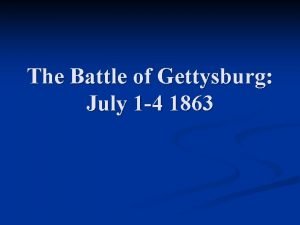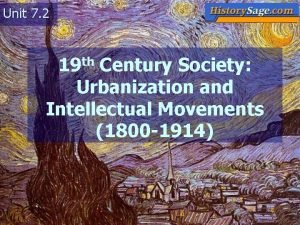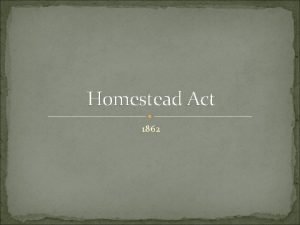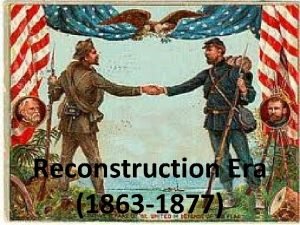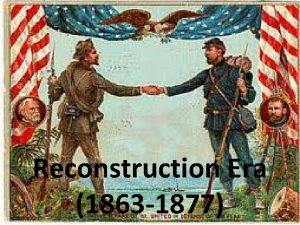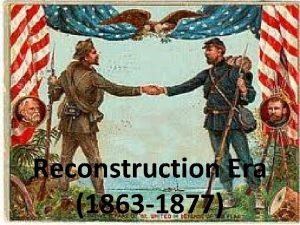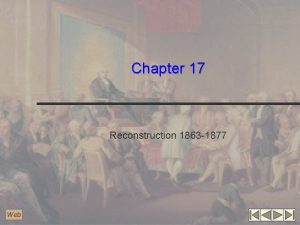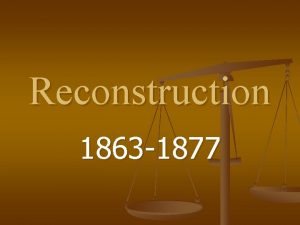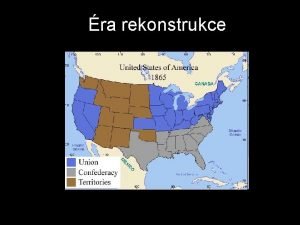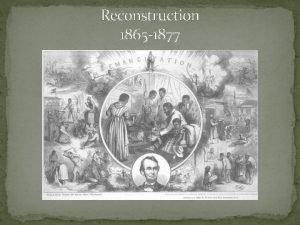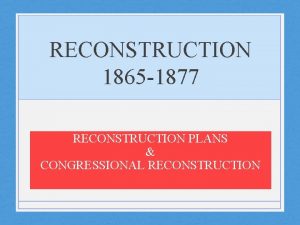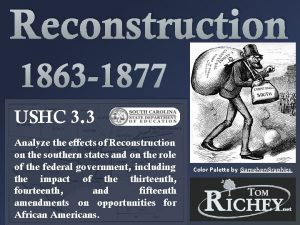RECONSTRUCTION 1863 1877 THE DEFEATED SOUTH The Civil

























- Slides: 25

RECONSTRUCTION 1863 – 1877

THE DEFEATED SOUTH • The Civil War settled the constitutional crisis of the justification of secession invoking “states’ rights”—the United States is one, singular, nation in which the federal government takes precedence over the state governments • The South had been thoroughly defeated, and lay it economic ruins • The South resented its conquered status • The emancipation of slaves and the changing political and social status of African Americans in the South was an affront to white supremacy, and racism would be one of the driving forces that undermined Reconstruction

LINCOLN’S PLAN • Reunification as swiftly as possible, protecting private property and opposing harsh punishments • Amnesty was promised to those who swore allegiance to the Union • State governments could be established if 10% of the voters took the loyalty oath (Ten Percent Plan) • The Radical Republicans passed the Wade-Davis Bill in the hopes to punish the South by requiring 50% of citizens to take loyalty oath, and promoting equal protection of African Americans under the law • Lincoln used the “pocket veto” (refuses to sign it and lets it die after ten days of the adjournment of Congress) • Congress established the Freedmen’s Bureau to provide food, clothing and fuel , as well as education to former slaves and poor whites • How will Congress redistribute confiscated land?

ANDREW “TENNESSEE” JOHNSON • Lincoln’s assassination brought Andrew Johnson, a loyal Southern Democrat into the presidency • He had campaigned hard against the South during the war, referring them as “traitors, ” and blamed individuals rather than the whole South for secession • Johnson’s Presidential Reconstruction Plan: • Extended pardons to southerners who took loyalty oath • Restored the property rights of Confederates who swore loyalty oath • He initially excluded the wealthy landowners and political elite, out of personal hatred, but if they applied individually, he pardoned them (90% who applied were pardoned) • Plan failed to include any measures dealing with voting rights and civil rights of former slaves • Johnson’s restoration plan was done while Congress was out of session

RADICAL RECONSTRUCTION • The Radical Republicans (RRs) were angered at Johnson’s view that Reconstruction fell under executive jurisdiction, not legislative • The RRs wanted to remake the South in the North’s image, advocating land redistribution making former slaves landowners (Thaddeus Stevens) • Black codes angered Northerners and united the Republicans to exclude southern reps when Congress reconvened in Dec. 1865 • The united Congress overrode Johnson’s vetoes of the Civil Rights Act of 1866 (giving full citizen ship to blacks, overturning the Scott Decision, and eliminating black codes); and expansion of the Freedmen’s Bureau • Republicans campaigned hard against Johnson and the Democrats and won control of Congress in the 1866 elections • The Republican Congress now sought to take control of Reconstruction away from Johnson

CONGRESSIONAL RECONSTRUCTION • Reconstruction Act of 1867: • Divided the South into five military districts subject to martial law • Each southern state had to draft new constitutions guaranteeing African American voting rights • States must ratify the 14 th Amendment • Oaths of loyalty • Tenure of Office Act: anyone appointed by the president and approved by the Senate COULD NOT BE REMOVED without Senate approval of a successor • When Congress adjourned, Johnson fired Sec. of War Stanton and appointed Grant in defiance to the act • Grant sided with the Republicans and allowed Stanton to return; Stanton barricaded himself in his office • The House voted to impeach Johnson; the Senate fell one vote short of conviction! • This set the precedent that criminal actions by the president can be checked by Congress and potentially removed from office


ELECTION OF 1868 • By 1868, 7/11 rebel states were back in the Union • Republicans nominated Ulysses S. Grant for president • The Republican platform attacked the Democrats’ loyalties to the Union and to Reconstruction • The Democrats exploited Northern racism, and used terror in the South to keep blacks and white Republicans from voting (The KKK) • Grant won with only 53% of the pop. vote • Congress passed the 15 th Amendment in 1870 and required the remaining rebel states to ratify BOTH the 14 th and 15 th amendments for readmission –all states were back by Feb. 1870

WOMAN SUFFRAGE IN RECONSTRUCTION • Women’s rights advocates were outraged that the 15 th Amendment gave ALL MEN (including African Americans) the right to vote, but NOT WOMEN • The women’s movement split over whether to support a linkage between the rights of women and African Americans: • The radical faction fought against the 15 th Amendment and formed an all-female suffrage group (NWSA) • The more moderate factions supported the amendment and worked towards suffrage at a state level, remained close with the Republicans, and enlisted the help of men

THE MEANING OF FREEDOM • For many freed African Americans, freedom simply meant the freedom to “move about, ” no longer having to show deference to whites; they sought out new lives in predominately black areas and cities, yet many returned to seek work in their old neighborhoods • Freedom to unite with family: African Americans began to fulfill the appropriate gender roles with men taking on more authority in the family (denied by slavery) and women working outside the home • Black men could now serve on vote, serve on juries, and hold office • Freedom of worship and education: • Church building was the most important element of institution building after emancipation • African American communities pooled their resources to establish churches, the first social institution they fully controlled • By 1869, over 3, 000 Freedmen’s Bureau schools were teaching over 150, 000 students (roughly 3, 300 teachers were African American) • Black colleges were founded, initially to train African American teachers (Fisk, Tougaloo, and Hampton)

LAND LABOR AFTER SLAVERY • Though African Americans sought work outside of plantation life and a chance for economic autonomy, the white planter elite tried to keep blacks as permanent agricultural laborers (black codes restricted their employment) • Congress had abandoned its experiments in land redistribution and Johnson ordered that free blacks (who had established a life on that land) be evicted, creating a bitter notion of betrayal • Sharecropping became the dominant form of working the land after Reconstruction, representing a compromise between planters and former slaves • It allowed families to stay together, group together and work the land, setting their own hours and tasks • By 1880, nearly 80% of the land in the Deep South was divided into family farms, and about 75% of black southerners were sharecroppers

ORIGINS OF AFRICAN AMERICAN POLITICS • Former slaves organized politically to protect their interests and to promote their own participation (mass meetings, parades and petitions demanding civil equality and voting rights); inclusion into society was their objective • Five states in the Deep South had black electoral majorities (FL, MS, AL, LA, and SC) • The Union League (chapters of Republican organizations in northern cities) became the voice of former slaves as they helped organize freedmen in the south after 1865 • Hiram Revels became the first African American elected to the US Senate in 1870, ironically filling Jefferson Davis’ former seat!


SOUTHERN POLITICS AND SOCIETY • Most Republicans were moderates who were satisfied with Reconstruction: it had reunited the country and established a viable Republican Party in the South • Yet this goal required active federal support to protect African American voters upon which it depended, proving southern Republicanism to be unstable at best • The Southern Republican voice was made up primarily of African Americans, “carpetbaggers (white middle-class northerners who moved South to benefit from Reconstruction), and the native “scalawags” (white southerners who were businessmen, Unionists looking to regain political influence)

RECONSTRUCTING THE STATES: A MIXED RECORD • Throughout the South, the new state constitutions, especially those with a significant African American presence, instituted political and humanitarian reforms granting civil and political rights to blacks • Republicans had to balance their reforms against needs carefully: though equal rights were promoted, segregation (especially in schools) was prominently enforced— Republicans were afraid to lose their white support and feared divisions in their party • Republicans did little to assist African Americans in acquiring land • Republicans promoted northern-style prosperity and gave heavy subsidies for railroad development, which frequently opened the doors to corruption

WHITE RESISTANCE AND “REDEMPTION” • Many white southerners believed that the Republicans were not a political groups and refused to acknowledge their right to participate in southern political life • The Ku Klux Klan in the 1870 s used terror to destroy the Reconstruction governments and intimidate (or kill) white sympathizers and African Americans who dared participate in politics • White sought to restore “white supremacy” in the South • The Enforcement Acts (1870 -1), including the KKK Act, made the violent infringement of civil and political rights a federal crime; Grant sent troops into SC and more or less obliterated the Klan, and restore a semblance of law and order by 1872 • The Civil Rights Act of 1875 outlawed racial discrimination in public places • As wartime idealism faded, and the Democrats gained strength in the North, northern Republicans abandoned blacks and their white allies • The Democrats (or Redeemers) won control of the southern states (by 1877 Democrats would regain control of all the former Confederate states)


THE SUPREME COURT AND RECONSTRUCTION • Between 1873 and 1883, the USSC weakened enforcement of the 14 th and 15 th Amendments and overturned convictions of KKK members • Slaughterhouse cases (1873): 14 th amendment rights (citizenship rights) are under state, not federal, jurisdiction • US v. Reese; US v. Cruikshank(1876): restricted Congress from enforcing the KKK Act, leaving it again under state jurisdiction; the 14 th Amendment only protected citizens if they are discriminated BY THE STATE, and the 15 th Amendment DID NOT guarantee a citizen’s right to vote, it just barred states from denying suffrage— leading the way for poll taxes, property requirements, literacy tests, etc. • 1883 Civil Rights Cases: the USSC declared the Civil Rights Act of 1875 unconstitutional stating the federal government could only outlaw discrimination in the states, but not private individuals

KING COTTON: SHARECROPPERS, TENANT FARMERS, AND THE SOUTHERN ENVIRONMENT • The South grew heavily dependent on cotton as most farmers went from subsistence farming to cotton to sell on the market • The “crop lien” system provided loans in exchange for a lien on the crop (loan like a mortgage) • As this system spread, the cost spiraled downward, and cotton farmers became a part of a cycle of debt (sharecropping and tenant farming became the majority role of poor whites and blacks) • The South emerged into the country’s poorest agricultural region

THE AGE OF CAPITAL • In the decade after the Civil War, the North continued an industrial boom that concentrated industries into the hands of a few big businesses • The Railroad industry symbolized this new industrial order, becoming the first “big business” in America: the completion of the Transcontinental Railroad (started during the war) finished in 1869 solidified this • Several Republican politicians maintained close connections with the railroad interests • The Credit Mobilier Scandal (broke in 1872): where federal money was dumped into a “dummy” corporation and Republican stockholders received kickbacks • Scandal destroyed Grant’s presidency (though he didn’t know about it—though it involved the VP)

LIBERAL REPUBLICANS AND THE ELECTION OF 1872 • The Republican Party underwent dramatic changes: • Party leaders concentrated on holding onto federal patronage, and a growing number of members were appalled by the corruption and sought alternatives • Liberal Republicans were suspicious of expanding democracy and called for a return to limited government, civil service reform to break the spoils system, and called for the end to federal involvement in Reconstruction • Though Grant won reelection (due to his popularity for ousting the Klan, and despite scandal) the Liberal Republican agenda grew in influence

DEPRESSION OF 1873 • Up to that time, the longest depression in history • Due to commercial overexpansion, speculative investment in the railroads, the inability to market millions of dollars of railroad bonds • Prices fell, unemployment rose, and people sank into deep debt • The government rejected appeals for relief (most officials saw depressions as natural, albeit painful, parts of the economic cycle) • Clashes between labor and capital led many to question whether their society was truly a “harmony of interests”

THE ELECTION OF 1876 • More scandals in the Grant administration hurt the Republicans (Whiskey Ring involving Grant’s private secretary, and the Sec. of War receiving bribes in exchange for land in Indian Territory) • The Democrats nominated Samuel J. Tilden of NY, a former prosecutor, who brought down the Tweed Machine (of Tammany Hall) in NYC, and who attacked the Republicans and Reconstruction as corruption personified, riddling the government with “incapacity, waste, an fraud” bringing prosperity to few, and hard times to many • The Republicans nominated Rutherford B. Hayes of Ohio, who promised civil service reform and to clean up corruption • Tilden won the popular vote and the uncontested electoral vote (but was one vote shy of a majority) • The election was unprecedented as the Republicans refused to concede and forced Congress to form the Electoral Commission, that elected to give the contested electoral votes to Hayes, who then won the presidency • The Democrats cry foul and a compromise is decided


THE COMPROMISE OF 1877 • Hayes and the Republicans kept the presidency • The Republicans promised to fund more southern internal improvements and noninterference in southern affairs • Appoint a southerner to Hayes’s Cabinet • Hayes removed all remaining federal troops from the South (symbolizing the end of Reconstruction) • This allowed for the Democrats to take control of all state governments in the South
 Chapter 6 civil war and reconstruction
Chapter 6 civil war and reconstruction Remembering world war 1 achieve 3000
Remembering world war 1 achieve 3000 Unit 4 civil war and reconstruction
Unit 4 civil war and reconstruction Unit 5 civil war and reconstruction
Unit 5 civil war and reconstruction Civil war and reconstruction study guide
Civil war and reconstruction study guide Reconstruction vocabulary words
Reconstruction vocabulary words Where did impressionism originated
Where did impressionism originated Edouard manet olympia 1863
Edouard manet olympia 1863 July 1-4 1863
July 1-4 1863 The three uses of money
The three uses of money The stonebreakers
The stonebreakers Constitucion de 1863
Constitucion de 1863 Olympia, 1863
Olympia, 1863 Manet, olympia, 1863
Manet, olympia, 1863 Soddies definition
Soddies definition Edouard manet olympia 1863
Edouard manet olympia 1863 Hjälper sedan 1863
Hjälper sedan 1863 Manet, olympia, 1863
Manet, olympia, 1863 Edouard manet olympia 1863
Edouard manet olympia 1863 Nov 19 1863
Nov 19 1863 Who killed reconstruction north or south
Who killed reconstruction north or south Civil rights and civil liberties webquest
Civil rights and civil liberties webquest Reconstruction art definition
Reconstruction art definition Whats the compromise of 1877
Whats the compromise of 1877 Compromise of 1877
Compromise of 1877 The gilded age 1877 to 1898 worksheet answers
The gilded age 1877 to 1898 worksheet answers








